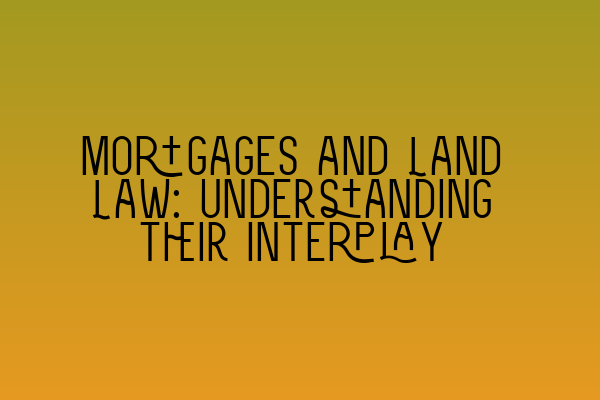Mortgages and Land Law: Understanding their Interplay
When it comes to property transactions, mortgages play a crucial role in facilitating the purchase of real estate. Understanding the interplay between mortgages and land law is essential for both solicitors and property buyers or sellers. In this article, we will dive deep into the intricacies of mortgages and how they coincide with land law in the United Kingdom.
What is a Mortgage?
A mortgage is a legal agreement between a borrower (mortgagor) and a lender (mortgagee) that provides the borrower with a loan to finance the purchase of a property. The property itself acts as collateral for the loan, giving the lender security in case of default.
Now, let’s explore the key aspects of mortgages and how they interconnect with land law:
1. Creation and Registration
When a mortgage is created, it is essential to ensure proper registration to protect the lender’s interest in the property. This registration takes place with the Land Registry, and it is crucial for the lender to be listed as the legal owner of the charge.
For a deeper understanding of creation and registration, refer to our article on SQE Preparation for Property Practice: Mapping Out Your Strategy.
2. Priority and Priority Searches
In property transactions, the priority of a mortgage determines its rank concerning other charges or interests on the property. Understanding priority and conducting priority searches is vital to protect the lender’s position and ensure their mortgage takes precedence over subsequent charges.
Discover more about priority and its implications in our article on Updates in UK Property Laws: Key Changes and Implications.
3. Discharge and Redemption
When a mortgage is paid off, it is crucial to discharge the mortgage from the Land Registry. This process ensures that the borrower is no longer encumbered by the mortgage and holds full legal ownership of the property. As a solicitor, guiding clients through the discharge and redemption process is integral to completing a property transaction.
For a comprehensive guide on handling legal challenges in property transactions, including discharge and redemption, refer to our article on Legal challenges in property transactions: A comprehensive guide.
4. Foreclosure and Repossession
In unfortunate circumstances of mortgage default, lenders may need to exercise their rights of foreclosure and repossession. As a solicitor, it is crucial to understand the legal process involved in enforcing these actions while also considering the borrowers’ rights and protections under land law.
For a thorough understanding of lease laws in the UK that are applicable during foreclosure and repossession, our article on Navigating Lease Laws in the UK: Essential Guidelines for Tenants and Landlords provides essential guidelines.
5. Mortgage Fraud and Anti-Money Laundering
Mortgage fraud and money laundering pose significant risks to both lenders and the integrity of property transactions. As a solicitor, it is essential to be vigilant and adhere to anti-money laundering regulations to prevent fraudulent activities and protect the interests of all parties involved in a property transaction.
To avoid common pitfalls and stay on top of property law questions, our article on Dominate Property Law Questions: Avoiding Common Pitfalls provides valuable insights.
Conclusion
Understanding the intricate relationship between mortgages and land law is paramount for solicitors practicing property law and for individuals involved in property transactions. By grasping the creation and registration process, prioritizing the lender’s interest, navigating discharge and redemption, handling foreclosure and repossession, and preventing mortgage fraud, solicitors can ensure seamless property transactions and protect the rights and interests of their clients.
For more information and comprehensive resources related to property law and land law for SQE preparation, visit SQE Property Law & Land Law.
